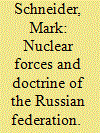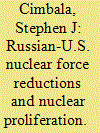|
|
|
Sort Order |
|
|
|
Items / Page
|
|
|
|
|
|
|
| Srl | Item |
| 1 |
ID:
083252


|
|
|
|
|
| Publication |
2008.
|
| Summary/Abstract |
The American "way of war" is oftentimes critiqued solely in relation to either concurrent or recently concluded conflicts. Such emphases on contemporary "lessons learned," or, alternatively, forgotten, perhaps ignore the formative context of strategic cultures that have preceded ours. This article objectively compares a sampling of history's military "superpowers" within three dimensions: collective action, historical determinism, and resource context. Viewing the ways of war of these societies with an eye toward our own provides an illuminating perspective of the echoes and origins pointing toward America's strategic culture today
|
|
|
|
|
|
|
|
|
|
|
|
|
|
|
|
| 2 |
ID:
083253


|
|
|
|
|
| Publication |
2008.
|
| Summary/Abstract |
The relatively new concept of "strategic culture," though under discussion for a generation, has been underdeveloped. This article defines the concept clearly, critiques several other scholars' definitions, and traces the powerful influence of geography upon the phenomenon. It identifies two coalitions of subcultures in America which respectively tend toward isolationism and interventionism. These coalitions compete with each other for dominance, alternately winning or losing depending on the degree of success of the national security elite in rallying normally isolationist subcultures around efforts to cope with international crises which the elite, for geostrategic reasons, has either provoked or misrepresented
|
|
|
|
|
|
|
|
|
|
|
|
|
|
|
|
| 3 |
ID:
084090


|
|
|
|
|
| Publication |
2008.
|
| Summary/Abstract |
Nuclear weapons and strategic strike capability are the highest priority of the Russian Federation. Russia is deploying both advanced new strategic nuclear delivery vehicles and new types of nuclear weapons. Russian military leaders have openly stated that Russia has deliberately lowered the nuclear use threshold and talk about the use of nuclear weapons in regional and local wars. This is attributed to weakness in conventional forces. However, a number of respected Russian military analysts argue that the real motive is to increase political clout against the United States and NATO. Russia has formally adopted a nuclear escalation doctrine in which the introduction of nuclear weapons into a conventional conflict is characterized as "deescalation" of the conflict. Unlike NATO's "flexible response" doctrine of the 1960s-the nearest parallel to current Russian thinking-there is a dangerous assumption that the use of few nuclear weapons will end a conflict with a Russian victory. Failure to view Russia realistically could endanger U.S. national security in the future.
|
|
|
|
|
|
|
|
|
|
|
|
|
|
|
|
| 4 |
ID:
084093


|
|
|
|
|
| Publication |
2008.
|
| Summary/Abstract |
Strategic culture is an amalgam of a country's set of shared beliefs, assumptions, and narratives that shape its strategic decision-making process. This article evaluates Iran's evident pursuit of nuclear weapons in light of four key elements of its strategic culture as an attempt to ascertain Iran's goals for developing these weapons. These four elements include: (1) an all-encompassing conviction in Shia Islam as the bedrock of the regime's political legitimacy and the country's national identity; (2) a hypernationalistic belief in Iran's rightful place as the leader of the Islamic civilization and as a regional hegemon; (3) a pervasive sense of external and internal vulnerability; and (4) an ingrained perception that the U.S. desires to dominate and eventually destroy the Islamic civilization. The evaluation of these elements strongly augurs that a nuclear-armed Iran is not likely to employ these weapons offensively due to its fear of retaliation and the constraining interests within its regime's political structure. Rather, its drive toward a nuclear-weapons capability is to provide Iran with a defensive deterrent that will advance its desires for regional hegemony and mitigate its pervasive sense of insecurity.
|
|
|
|
|
|
|
|
|
|
|
|
|
|
|
|
| 5 |
ID:
083254


|
|
|
|
|
| Publication |
2008.
|
| Summary/Abstract |
Since the breakup of the Soviet Union, Russia has been trying to define its identity in an ever-changing international security environment where it has seen itself as a great power. This belief is further conveyed through Russia's attempts to influence the policies of other states in the region, most notably those in the near abroad including Lithuania, Latvia and Estonia (i.e. the Baltic countries), which are regarded as part of Russia's sphere of influence. For Russia, and previously the Soviet Union, the Baltic countries were seen as a buffer zone against Western encroachment. Through a number of policies and policy levers (i.e. diplomatic pressure, propaganda and disinformation campaigns, military threats and peacekeeping deployments, economic leverage and energy controls, exploiting ethnic and social discontent, and discrediting governments via political influence and penetrating intelligence services), Russia has tried to maintain its influence upon them in order to manipulate their foreign, security and domestic strategies, and thus far, it has been unsuccessful in its attempts to do so.
|
|
|
|
|
|
|
|
|
|
|
|
|
|
|
|
| 6 |
ID:
084092


|
|
|
|
|
| Publication |
2008.
|
| Summary/Abstract |
Russia and the United States have a special responsibility to connect "vertical" nuclear disarmament and "horizontal" nonproliferation. Russian and American behavior will influence the choices made by nonnuclear states about the decision for a nuclear weapons capability or for the acquisition of a complete nuclear fuel cycle with the potential for weaponization. This study uses an analytical model to examine the stability of a possible future world in which nonproliferation efforts "hold the line" against new nuclear states, while the U.S. and Russia maintain stable deterrence at reduced levels of deployed forces.
|
|
|
|
|
|
|
|
|
|
|
|
|
|
|
|
| 7 |
ID:
083251


|
|
|
|
|
| Publication |
2008.
|
| Summary/Abstract |
In April-May 2007, Estonia experienced several weeks of coordinated cyberattacks against its financial and sociopolitical institutions. Although the origin of these attacks cannot be definitively named, it is widely believed in Estonia and among many analysts that Moscow was behind these attacks. Certainly these attacks represented the culmination of plans set in motion a year earlier to attack the Estonian government and society for their supposedly anti-Russian policies. And the accompanying demonstrations in Tallinn at this time also represented well-worn Soviet techniques used in earlier coups in Eastern Europe. Ultimately the advent of such new forms of military operations confirms a threat assessment by which any one operation on land, sea, air, underwater, or space can target anyone in any of these dimensions and raises provocative issues for both analysts of war and government officials.
|
|
|
|
|
|
|
|
|
|
|
|
|
|
|
|
|
|
|
|
|